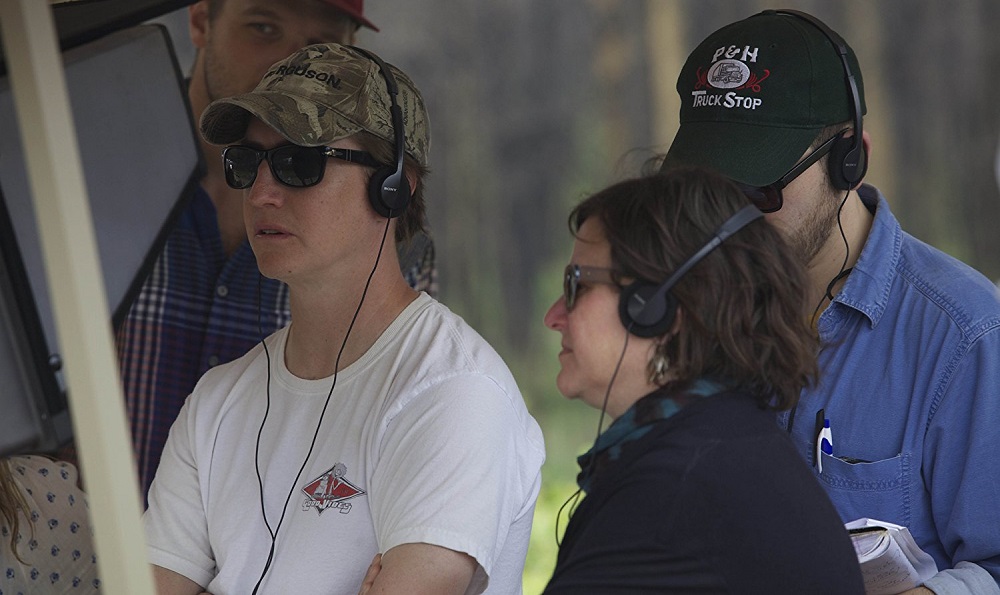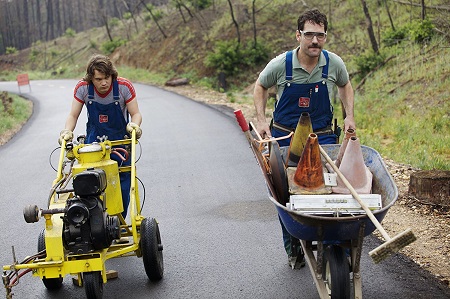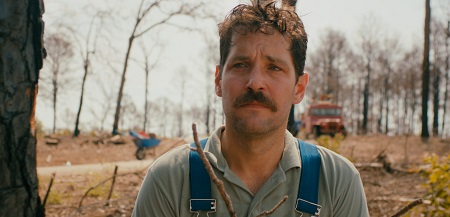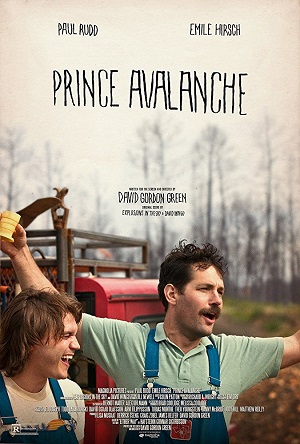
“Prince Avalanche” – Interview with David Gordon Green
by Sara Michelle Fetters - August 16th, 2013 - Film Festivals Interviews
a SIFF 2013 interview
Finding Truth in Collaboration
David Gordon Green Talks Prince Avalanche, Nicolas Cage, Suspiria and Being a “Workaholic Movie Junkie”
It was time for break. After three studio comedies in a row, Pineapple Express, Your Highness and The Sitter, writer/director David Gordon Green knew he wanted to return to the small-scale days of his earlier films. Utilizing the Icelandic import Either Way for inspiration, the filmmaker headed into the wilderness with a stripped-down script, precious few crew members and actors Paul Rudd and Emile Hirsch in tow, none of them at certain what it was they were going to come up with or what the finished product was going to be. Green wouldn’t have had it any other way.
“One of the things that’s really difficult as a filmmaker is reading about what you’re doing before you’ve done it,” admits the filmmaker with a grin. “There becomes this expectation of judgment before you’ve done anything. People will get upset about your cast. They’ll be upset that you’re remaking this beloved movie. But you haven’t made your movie yet. You haven’t done anything, and that effects the perception of what it is you’re doing. What it is you’re about to do.
“My experiment was, can I make a movie in a vacuum? Is there a low enough budget? Is it a close enough community of people making it with you, meaning I don’t have to ring the doorbell of Hollywood in order to raise money? Can I call people in my rolodex in order to make this movie? Can we collaborate? Can I say, on the quiet, do you want to make this movie with me? We’ll shoot it over a couple of weekends in May. We’ll collaborate. We’ll have a good time. In the end, the finished product is what it is.”
The result of all of this is Prince Avalanche, a quiet, introspective little drama with comedic touches about two highway workers, Alvin (Rudd) and Lance (Hirsch), tasked with painting a desolate stretch of mountain roadway recently devastated by a forest fire. It was a risky proposition, not because the film was an expensive one, but more because it would require cast and crew to immerse themselves completely within the setting and the ideas presented within the script for the entire length of shoot. They’d be forced to live, work and collaborate on the hush-hush, and even though the time frame was condensed and Green wasn’t asking for a big, multi-month commitment (actual shooting took less than a week), that didn’t mean everything was comfortable and/or easy.
“Everyone that I called said yes,” says the director proudly. “That’s an amazing feeling. I get goose bumps thinking about it. The pride of collaboration. The pride of friendship. The pride you have in making something you’re personally invested in. When we got down to Austin [to shoot] Emile asked me who this movie was for and I answered, we’re making this movie for us. I think that was a great, liberating thing. You’re there, on the set, saying to everyone, ‘I trust you.’ I could talk to the boom operator and he’d give me a good suggestion and we’d act on that. Same went for everyone. It was such a small, intimate crew made up of many of my best friends and it was gratifying to know that I don’t need the mechanisms of the Hollywood industry to pull together a group such as this and produce something I can be very proud of.”
For the most part, making Prince Avalanche wasn’t so much an attempt to leave behind the genre of his last three studio pictures as it was a desire to do something small and intimate, to recharge his batteries before moving on to his next project. It was also an opportunity to tap back into the types of absurdist moments and ideas that make the director himself chuckle. Things did not, however, work out exactly as planned.
“I have a very peculiar sense of humor,” Green proclaims. “I set out to make a Prince Avalanche that I thought was going to be very funny. I still love comedy, I love making people laugh, and one of the things I love is awkwardness. It’s like farting in church. You know you shouldn’t, and yet it’s sometimes the best, funniest thing.
“With this movie, I thought we were going to make something awkward and uncomfortable but also very funny. But the weird thing that evolved with Prince Avalanche is that it became very serious. I wouldn’t say overly dramatic, but it did become emotional. We started out to make this funny, awkward, odd couple sort of comedic film and we ended up falling in love and breaking each other’s hearts and bringing real relationships and dialogue with honest bits of heartbreak into [Alvin and Lance’s] stories. The success while we were filming it was the discovery we were making something much more honest than what we had originally set out to make. The ending project, while still funny, ended up not being a comedy at all but instead a drama with a lot of bizarre, absurd, humorous elements.”
That humor is born out of reality, and there was a fine line between the absurd and the normal the filmmaker knew he was going to need to walk if he and his team were going to put together a narrative that connected with audiences. “Honesty is on its sleeve,” says Green about his film, “but that’s in large part due to the circumstances we purposefully put ourselves in to make it. Part of the intimacy about making [Prince Avalanche] was that, while we were making the movie for ourselves, I think there ends up being an honesty that comes across that feels universal. It’s not manipulative. Hafsteinn Gunnar Sigurðsson, the Icelandic screenwriter [who wrote and directed the original film Either Way], has given us this wonderful character arc to play off of, allowing us to really dig in and discover for ourselves who these characters, Alvin and Lance, are. It was a discovery.
“But going back to humor, what made us laugh were these strange funny little pauses or these bits we think are humorous yet also realistic. We didn’t want anything that felt phony or cheap. I’ve made movies where we’ll get a standing ovation of people laughing at the most absurd stuff yet I personally don’t find it particularly funny. But when you’re making that type of movie and it is funny for a mass audience then it deserves to be in the movie, that’s just how it is. You have to get people on their feet, get them engaged in the movie in that way. But this movie didn’t need that. It just needed honesty. If it didn’t have honesty then it without question would have failed.”
Not that the success Prince Avalanche has met with on the festival circuit hasn’t caught Green somewhat by surprise. “When you’re working with the minuscule budget that we had all the movie needs is an intimate group of people to love it,” he states with conviction. “When you’re working with this kind of agenda the rewards can be pretty amazing. When you find an audience at Sundance or an audience at the Berlin Film Festival or an audience like those here in Seattle that love it for what it is and relate to it, that sort of blows your mind. Traveling with this movie internationally has been a real trip because a talky character piece made for Americans can go real bad when shown overseas. That hasn’t happened, though, audiences responding overseas as they do here in the States. I think that’s again a testament to how we made the film and our collaborative mindset as we were piecing it together.”
One of the narrative’s chief attributes is its willingness to get quiet, to revel in the setting and the atmosphere discovered by Green and his team while they were out on location. But many of the signature were not scripted, the filmmaker trusting his actors to work in tandem with himself and the crew to discover just what it was that was needed to give Alvin and Lance a bit of extra depth.
“A lot of that was improvised,” admits the director. “That weekend alone with Paul’s character Alvin, all of that was improvised. We had a day where we had to film Paul all alone and we just kept trying different things. Filming him with the donkeys, him fishing, him in the burned out house, and together we were all able to put together the quiet pauses of life in a way I don’t think we’d been able to had it all been scripted or storyboarded. We allowed Paul the freedom to explore, not just the world, but the character, in the process I think revealing more about Alvin to the audience even though there’s virtually no dialogue at all throughout the entire sequence.
“We only had a 65-page script. We didn’t have this crazy agenda of attempting to film ten pages a day. People were actually worried we had enough to make a complete movie, but I always knew there was a great 80, 85-minute movie here, it was just up to all of us to discover it during the shooting process. The pauses, the silences, they were important, but I think they also catch the audience somewhat off-guard. Mainstream traditional Hollywood movies don’t take the time to get quiet because they’re so worried about big points or the big reveals or the big Oscar-caliber speech. We didn’t have any of those agendas. We can watch Emile go across a log or see a turtle get eaten by a skunk. Those aren’t scripted things. Those are just moments we captured while we were filming that ended up being an important part of the finished film.”
Not that the filmmaker didn’t have strong ideas about who both Alvin and Lance were, his insights into what each man would do and why every bit as important as what Rudd and Hirsch brought to the conversation. “I kind of look at both characters as being me,” Green states modestly. “There’s the me that considers himself a great outdoorsman, a man’s man. And then there’s the part of me that just wants to go to a party and get laid. I wanted to try and find inside the puberty of adulthood how those different versions of myself could meet without resulting in a mid-life crisis. How could this odd couple of me coexist? It’s a mid-life realization. Now I can come out at the apex because I’m no longer struggling with myself. I looked at everything that Paul says to Emile and everything that Emile says to Paul, that very combative dialogue, as being kind of like my own internal struggle.”
Green and Rudd had been friends for a long time, each looking for a project they could collaborate on but never quite finding it. For Rudd, he appears revitalized, the opportunity to inhabit Alvin, make him his own, the popular comic achieving a melodic freedom he hasn’t for whatever reason been allowed to showcase in many of his more high profile, bigger-budgeted endeavors.
This is not something that has gone unnoticed, especially by Green. “He’s amazing in it,” says the director. “It makes me cry thinking about it, because he’s not necessarily going for the joke, and it isn’t because he’s not funny in the movie because I think he’s personally very funny in it. But there’s a beauty to Paul’s performance I find moving. There’s a sensitivity in his eyes I don’t think I’ve ever noticed in his comedic work. There’s a moment where Paul says, and it’s a simple line that kind of funny yet kind of sad where he says, ‘I read that pamphlet, too.’ It changes the entire relationship dynamic of the entire movie just because you look at him and he’s saying the most comforting thing but at the same time trying not to laugh himself at what it is he’s about to say. There’s something very specific and beautiful yet also extremely complex about what he achieves with just that one line.”
One of the more talked about moments of the film comes during the stretch when Alvin is on his own and Lance goes into town for the weekend to sow some oats. During this sequence the highway construction worker comes upon the shell of a burned-out home, rummaging through the remains while imaging it to be a house he’ll maybe someday own with someone special. Into this surreal madness walks Joyce Payne, an area resident who had no idea a movie was being shot right at the center of where she’d recently lost so very much.
“That woman that Paul encounters, none of that was in the script,” Green explains. “We just met this woman, Joyce, who was looking for her pilot’s license in the ashes of her home. What that scene was going to be, in my more comedic version of the movie, he was going to go into that burned out home by himself and then have ghost sex with his wife. But, we met this woman, and she was so amazing, that we were like screw that whole pantomime sex scene, that’s dumb. Let’s see what happens if he integrates and interacts with Joyce, this woman who just lost her home. Let’s see what happens. All of the sudden that just echoed throughout the remainder of the film. Took us to a plateau we might not have gotten to had she not wandered onto the set.”
As for what she signifies, the director is candid with his opinion. “I don’t know what she represents,” he admits. “It’s not a movie of mine I know well enough yet. I’m still curious about it, which is a weird, naive thing to say, but also a good thing, too. So I don’t know what Joyce represents, but it’s something amazing and beautiful. Her presence makes me sad and happy both at the same time.
“It’s interesting, too, because the truck driver character, actor Lance LeGault, he died right after we finished filming. That adds even another, ghostly gravity to it, I think. Watching his scenes now, on the set he was just this larger-than-life comedic guy, a funny dude, but in editing the movie I didn’t see him in quite the same way. I felt like I needed to honor his presence. There are some real surreal qualities I honestly can’t explain. At least not yet.”
Moving forward, the filmmaker is both enthusiastic about upcoming projects as well as a little saddened by the ones that have for whatever reason been forced to fall by the wayside. “I just finished a movie with Nicolas Cage,” smiles Green. “People read that and they think a certain thing. Their expectations are going to be blown out of the water. I’m so excited about it [Joe, debuting in September at the Toronto International Film Festival]. You think you know what this guy’s been doing these past few years? He’s about to unleash and remind you all that he’s one of the great actors working today. I’m so excited for people to get a look at it.
“As for Suspiria, it’s very difficult to find an artful representation of a difficult to finance strange movie with an incredible, prestigious cast when people don’t understand what it is you’re trying to accomplish. I just need to be left alone with a significant amount of money in order to try and make it correctly, but that’s sadly not how Hollywood works. It feels dead in the water.
“The same thing happened with Confederacy of Dunces and a few other projects I’ve tried to get off the ground on the sort of scale their respective stories require. I think once you start messing around with properties that are very much within the public awareness and with budgets that make people nervous all of the sudden you have to start answering a lot more questions that have nothing to do with the actual making of a quality film.”
“I do look at my career as momentum,” he summarizes. “A lot of people spend ten years contemplating their next move, while some of my favorite filmmakers, like Todd Haynes, will conceive of a project and see it all the way through then take a vacation to screw his head on straight before making another one. For me, I overlap. I go from one thing right into the next. I get up, I jump on a plane, I come here to Seattle, I head home, I shoot an episode of Eastbound and Down, I go do a Nike commercial, I rewrite a script I’ve been mulling over, I edit Joe, head out onto the film festival circuit with Prince Avalanche and I make plans to shoot a new movie in the Fall. I’m a workaholic movie junkie. I’m going to die young just making films.”
– Interview reprinted courtesy of the SGN in Seattle







